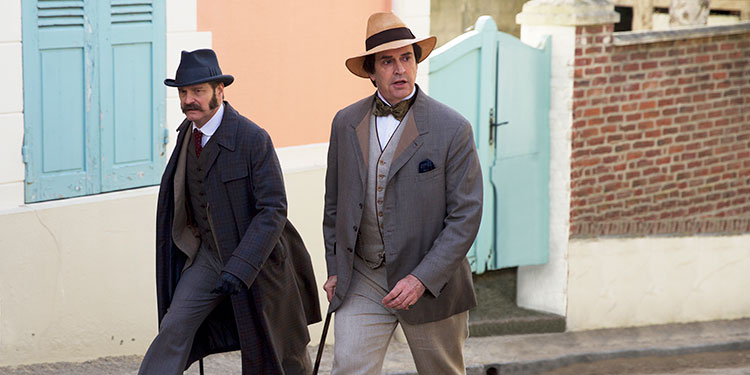
Director: Rupert Everett
Running Time: 105 mins
Certificate: NR
Release Date: June 15th 2018 (UK Cinema)

The Happy Prince has been a true passion project for writer, director and actor Rupert Everett. After years of trying to get it to the screen he’s finally been able to make the movie, which looks at the lesser known story of what happened to Oscar Wilde after was released from prison following his sentence for gross indecency with men.
Knowing his fame/infamy means staying in Britain is impossible, Wilde (Everett) heads for the continent. We first see him ill and barely surviving in Paris, still trying to live it up (beyond his means), but only just hanging on. The film then flashes back to his arrival in France when things seemed very different. Friends including Robbie Ross (Edwin Thomas) and Reggie Turner (Colin Firth) are keen to help him build a new life. He’s got money thanks to a stipend from his estranged wife and after two years of hard labour the sun of France gives Oscar a sense of optimism.
While Oscar pays lip service to changes that prison has caused and says he intends to reconcile with his wife, it quickly become apparent that he hasn’t changed that much. In many respects he becomes his own worst enemy, living an increasingly debauched life and spending beyond his means. Although Robbie and others try to stop him, Oscar contemplates a reunion with Lord Alfred ‘Bosie’ Douglas (Colin Morgan), the young aristocrat he was in love with before prison and who has a tendency to bring out Oscar’s most decadent, self-destructive side.
Everett has created an extremely watchable and engaging movie that attempts to bring a complexity to a story it would have been easy to simplify. The mythologised version of Wilde solely casts him as a tragic victim – a literary genius brought low by the homophobia of the era he lived in. The fact he died only three years after he was released from prison is typically used just to prove how badly he was treated. However, while The Happy Prince acknowledges how badly he was treated and the depth of the homophobia he was up against, it’s also extremely aware that he often brought problems on himself.
The Happy Prince looks at this self-destructive side, where Wilde’s epicurean impulses mean that despite how incisive he could be about others, he had a tremendous ability to rationalise his own bad acts. Wilde is both the hero and the villain of the movie, but Everett obviously has great empathy for him. There’s a sense within the movie of the writer/director understanding why someone would want to live like Oscar did – giving him an optimism that somehow he’ll be able to sort things out and that even when he’s doing something that are bound to end badly, it’s because he wants to live how he should be able to, not how he can.
However, despite this there’s sometimes a lack of clarity. The film lets us know what happened but isn’t always as good at the why. The complexity it attempts to bring to the story sometimes gets away from it, either leaving things completely up in the air or going for a simplistic explanation. That’s particularly true with Oscar’s wife, Constance (Emily Mortimer). The film is keen to acknowledge that Wilde’s actions and conviction destroyed her life as well, but it ultimately seems unsure how to deal with it beyond some over-simplified and very filmy suggestions of parallels between herself and the besotted Robbie Ross.
In fact, if it weren’t for the performances in the movie – particularly Everett in a role it feels he was born to play – the film would probably feel far baggier and less affecting than it is. Kudos should also go to Edwin Thomas as Robbie, who acts as the heart of the movie as he attempts to save Oscar from himself. It is a shame the film doesn’t provide as much clarity as it does ideas and information, but it undoubtedly brings a complexity to Wilde it would have been easy to ignore. Some may find it’s still too in love with it central subject to properly deal with it, but it’s worth sticking with.
Overall Verdict: Rupert Everett’s movie is certainly imperfect, but it’s also an absorbing look at a man who it’s easy to over-simplify and cut the harsh edges off. Wilde may be an extremely tragic figure, but The Happy Prince is well-aware that he was at least partly culpable in his own tragedy.
Reviewer: Tim Isaac
Leave a Reply (if comment does not appear immediately, it may have been held for moderation)